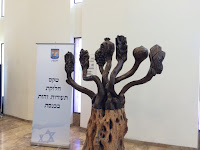Today we started the day studying Torah with scholar Renana Ravitsky Pilzer at the Shalom Hartman Institute. The topic was An Act of Love or an Act of War. "Words are nice when they come from someone who does what they say" Tosefta Yevamoth 8:5

It was an engaging and lively discussion about the role of a wife and the role of Torah study in a scholar's life and how Torah can be as engaging as a lover but sometimes interfere with the relationship of a husband and wife (or same sex couple in today's day and age).
We then went for a special visit in the Knesset- the Israeli Government. We first met with Lt. Col. Dr. Anat Berko who was elected as a Minister in 2005. She is the Chair of the Special Subcommittee for Secret Services- the 1st female to hold this position. She has an impressive resume which includes a Phd in Criminology, she is an author, and she is an Anti-terrorism expert. Her grandfather worked for the Ministry of Defense in Iraq, and her parents left Iraq when the Jews were being expelled and brought the family of 8 to Israel to build the country.
She had a lot to say about the conflict:
Would the United States tolerate rockets being fired at the civilian population?
Would the United States allow a politician to go all over the world and speak against their government and publicly support a terrorist organization? There are 13 Ministers in the Knesset who travel on their diplomatic passports and do just that saying that Bin Laden was a hero and that Israel is the enemy. They are in the Israeli government!
She was in NYC last week and a person stabbed someone in a grocery store and was shot dead by the NYC police with 9 bullets- where is the outcry for excessive force?
There is a disproportionate microscope on the the state of Israel.
She frequently meets with the Deputy Prime Minister of Hamas and he told her that he loved her Iraqi father because he gave her the best education. He would rather his son marry a Jewish woman over a Shia muslim woman! She said- The Arabs hate each other more than they hate us.
After our visit, we had a quick tour of the building- saw some beautiful Chagall tapestries representing the past present and future of Israel. We were in the building on an exciting day as Avigdor Lieberman was being installed as Defense Minister. He is only the 2nd non-military person to hold this position. We got to go in to the plenum hall where the benches are in the shape of the menorah. We saw Yehuda Glick get sworn in to a position that was recently vacated. It was very moving to hear him start his speech by reciting the Schecheyanu prayer which we recite for new beginnings. Only a year and half ago, he was shot by Arab terrorists and survived 8 or so bullets.
We had a free afternoon so I met my friend, Eric Esses, for lunch at the Israel museum, and then finished up my shopping with some friends on Ben Yehuda St. We closed our time together with a circle and each went around with a takeaway. I was a little bit speechless (hard to imagine, I know) because I have so much to take away.
I thought the program was amazing- the program was well planned, our tour guide was knowledgeable and engaging, and our leaders, Debbie Minkoff, a National Board member, and Barbara Goldstein, Deputy Director of Hadassah in Israel, were inspiring every step of the way. On Sunday, I had breakfast with Aviva Schnur, Mike's aunt who lives in Jerusalem, and is a tour guide at Yad Vashem, the Holocaust Memorial museum. She explained that they teach that Israel was founded despite the Holocaust. Others will say that Israel was founded out of the ashes of the Holocaust. Either way, it's the first time that I looked at Israel through the lens of the Holocaust. Not only because we visited Poland before we left, but because of what we did in Israel that helped to close the circle on the learning. Each speaker was more inspiring then the last and I can't even put into words all that I learned.
What I did say in the closing circle was that as a someone who is only getting started in Hadassah (despite being 4th generation life member) that every time we were introduced to people as "This is the future leadership of Hadassah", my heart skipped a beat because I'm not sure of what my place is as a future leader but it sure sounds exciting! BG leaned over and said, "You absolutely are a future leader, you should be excited." The other thing I said was that even though I've been to Israel so many times, coming to Israel this way, with this special group of women, all dedicated to Hadassah, Jewish values, Jewish family, and living and learning together for the last 9 days was amazing (it might not have been that eloquent but that's what I meant).
We had a quick meeting with Rabbi Adam Frank, the grandson of Rae Frank, whose parents sponsored our trip and he said, If anyone ever thanks you for coming to Israel, tell them to get lost, no one should welcome a Jew home. So welcome home!
Goodbye to Israel, every time I leave, it's with some new Hebrew words (I learned the word for flashlight) and I leave a little bit of my heart behind.




































